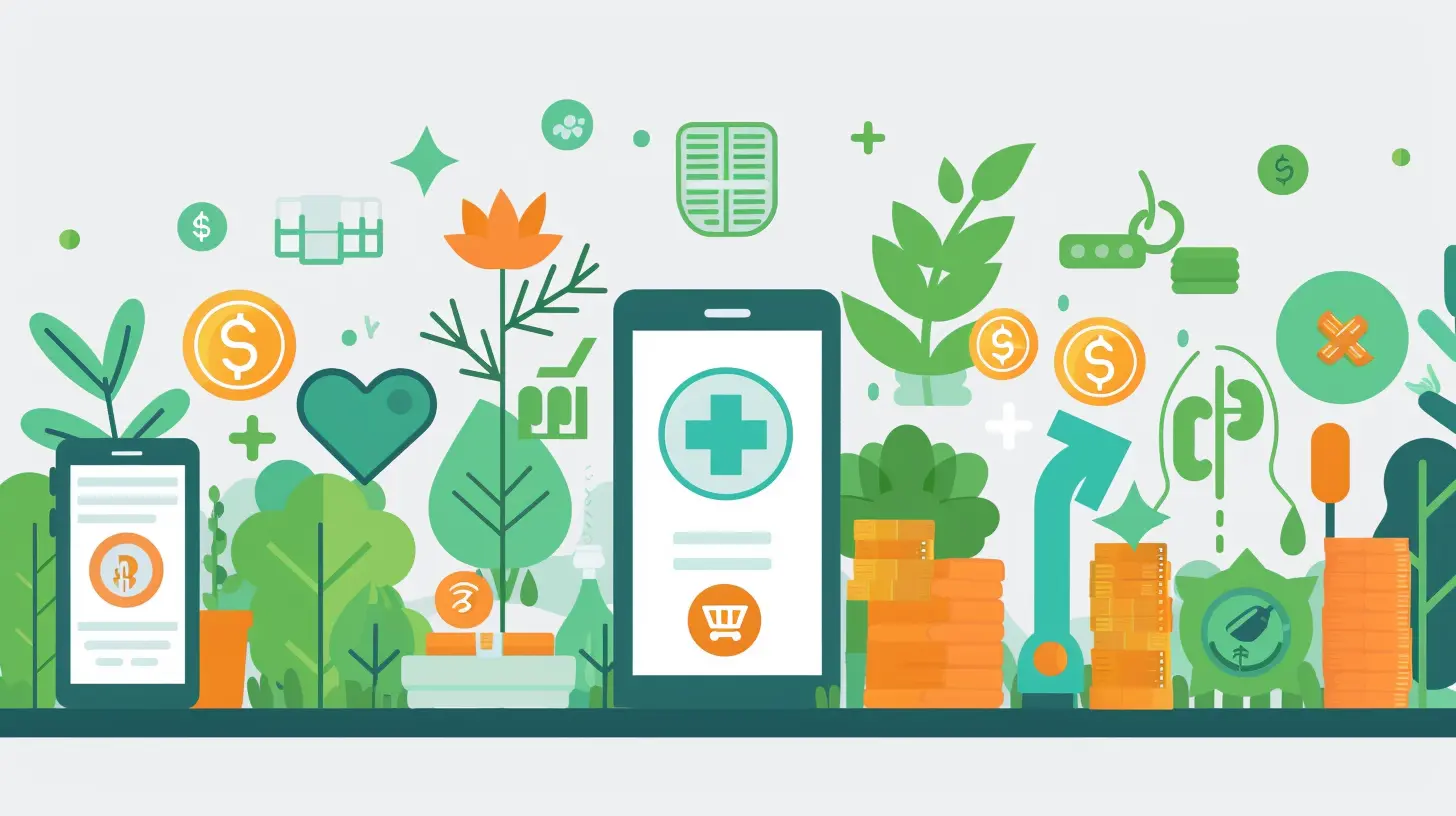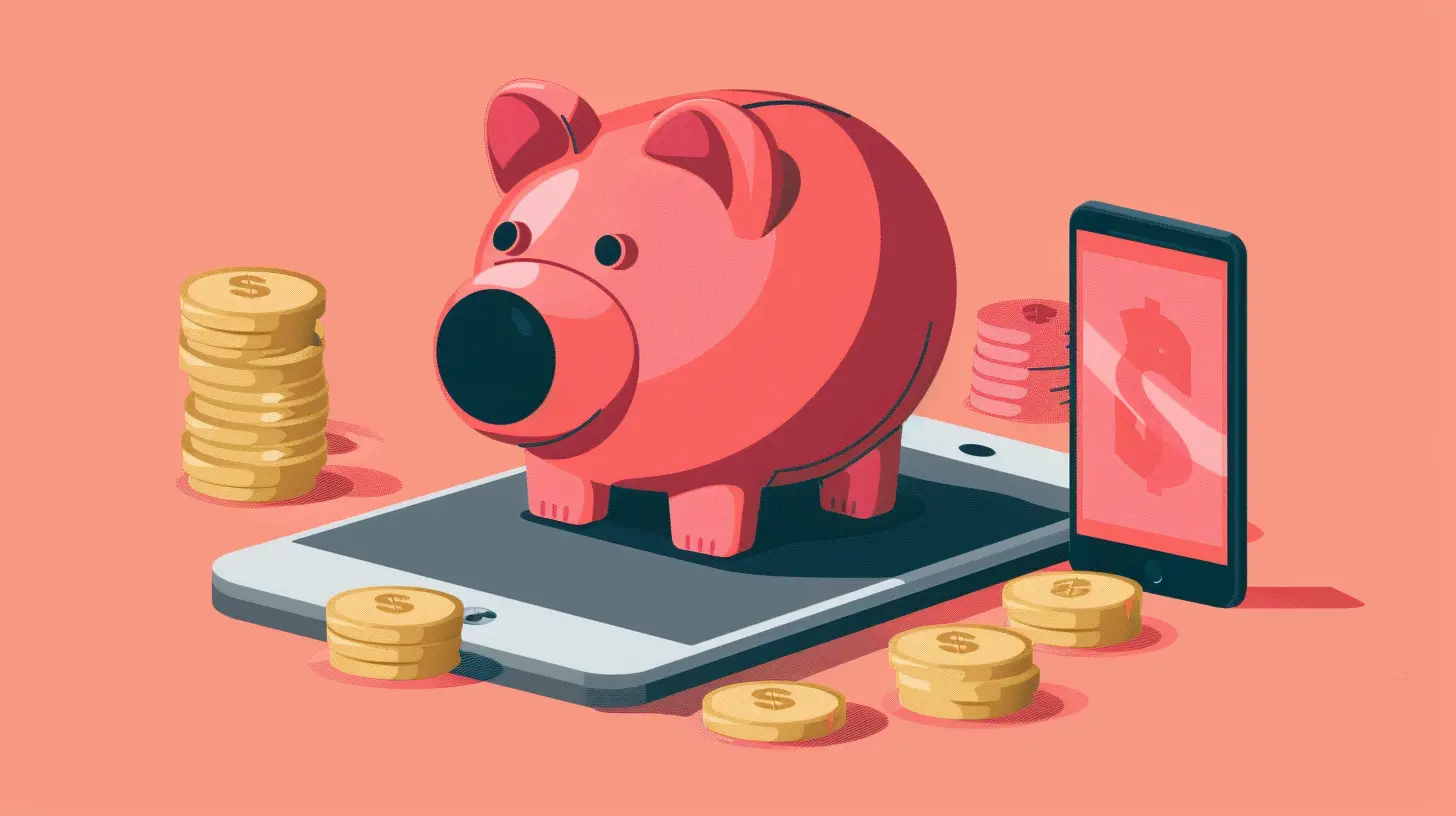The Intersection of Fintech and Healthtech: Financial Tools for Wellness
2 February 2025
Technology is changing every aspect of our lives—how we communicate, how we work, and even how we manage our health and finances. But what happens when two major tech sectors—fintech (financial technology) and healthtech (healthcare technology)—collide? Can financial tools really make an impact on your overall wellness?
Yes, they can. In this article, we’ll dive deep into the intersection of fintech and healthtech, exploring how financial tools are increasingly being used to improve our physical and mental well-being. If you're curious about how your financial health can directly impact your physical health, keep reading. You're in for some eye-opening insights.

What is Fintech and Healthtech?
Before we explore the intersection of these two fields, let’s take a quick refresher on what fintech and healthtech really are.Fintech (Financial Technology) refers to the use of technology to provide financial services and products. This includes everything from mobile banking apps to digital wallets like PayPal or Apple Pay, to even more complex innovations like blockchain and cryptocurrency. Fintech is all about making financial services more accessible, efficient, and user-friendly.
On the other hand, Healthtech (Healthcare Technology) is technology that is specifically designed to improve healthcare services. This can range from telemedicine platforms that allow you to consult a doctor from your smartphone, to wearable devices like Fitbits that track your physical activity, all the way to AI-powered diagnostic tools.
Now, when these two fields come together, they create a synergy that’s helping to redefine what it means to be healthy—both physically and financially.

The Connection Between Financial Health and Physical Health
You might be wondering—how does your financial health affect your physical health? Well, the connection is much stronger than you think. Let’s break it down.Financial Stress Leads to Physical Stress
We’ve all been there. Those sleepless nights worrying about how you’re going to pay the bills, or that pit in your stomach when your credit card balance is higher than your bank account. Financial stress is a very real thing, and it can have a profound impact on your physical health.Studies have shown that financial stress can lead to:
- Increased blood pressure
- Higher levels of anxiety and depression
- Unhealthy coping mechanisms (like overeating, smoking, or drinking)
- Difficulty sleeping
All of these factors can snowball into more serious health conditions like heart disease, obesity, and even mental health disorders.
Wellness is More Than Just Physical Health
Let’s flip the script for a moment. What if we looked at wellness from a holistic perspective? Wellness isn’t just about hitting the gym or eating a balanced diet. It’s also about your emotional, mental, and—yes—financial well-being.When you’re financially stable, you feel more in control of your life. You’re less likely to experience chronic stress, and that peace of mind can actually have a positive impact on your overall health. In short, financial well-being is a key aspect of your overall wellness.

How Fintech is Addressing Health and Wellness
Now that we’ve established the connection between financial health and physical health, let’s talk about how fintech is stepping up to the plate to promote wellness.1. Financial Wellness Apps
One of the easiest ways fintech is helping people manage their health is through financial wellness apps. These apps are designed to help users keep track of their spending, manage debt, and save for future goals—all of which can alleviate some of the financial stress that contributes to poor health.For instance, apps like Mint or You Need a Budget (YNAB) help users create and stick to a budget, which can reduce financial anxiety. Other apps like Acorns and Robinhood make investing accessible to people who might not have the time or knowledge to dive into the stock market. By making financial management easier, these apps allow users to focus on other aspects of their wellness.
2. Health Savings Accounts (HSAs) & Fintech Integration
Health Savings Accounts (HSAs) are another key area where fintech and healthtech are intersecting. HSAs are tax-advantaged accounts that allow you to save money specifically for healthcare expenses. But here’s where fintech comes in: many fintech platforms are now offering seamless integration with HSAs.For example, apps like Lively and Fidelity offer HSA management tools that allow you to invest your HSA funds, track healthcare expenses, and even predict future medical costs. This makes it easier to plan for healthcare expenses without dipping into your regular savings or credit cards, contributing to both your financial and physical well-being.
3. Wearables and Financial Incentives
Wearable technology like Fitbit and Apple Watch have already revolutionized how we track our health data. But now, fintech is stepping in to provide financial incentives for staying healthy.Several insurance companies are partnering with fintech platforms to offer rewards for hitting certain health goals. For instance, some life insurance companies will lower your premiums or offer discounts if you provide data showing that you’ve been exercising regularly or maintaining a healthy heart rate. This blend of healthtech and fintech not only motivates people to stay active but also rewards them financially for doing so.
4. Telemedicine and Financing Options
Telemedicine has exploded in popularity, especially after the COVID-19 pandemic. While it’s an amazing tool for accessing healthcare remotely, the cost can still be a barrier for some people. This is where fintech comes in.Fintech companies are now offering healthcare financing options directly through telemedicine platforms. Whether it’s a buy-now-pay-later approach or low-interest healthcare loans, fintech solutions are making it easier for people to afford the healthcare services they need without going into debt.
For example, platforms like CareCredit and Affirm allow patients to finance their medical appointments, procedures, or even prescriptions. This reduces the immediate financial burden, allowing patients to focus on their recovery rather than their medical bills.

How Healthtech is Enhancing Financial Wellness
So far, we’ve mainly discussed how fintech is contributing to health and wellness. But it’s a two-way street! Healthtech is also stepping up to improve financial wellness. Let’s explore how.1. AI-Driven Health Diagnostics and Cost Reduction
Healthtech advancements, especially in AI-driven diagnostics and telemedicine, are reducing healthcare costs across the board. By making diagnostics faster and more accurate, healthtech is helping people avoid costly medical errors or unnecessary tests. This, in turn, reduces the financial strain on individuals who are already struggling to afford healthcare.For instance, Babylon Health and Ada Health use AI to provide users with medical advice and symptom checkers, helping them decide whether they need to see a doctor or can manage their condition at home. This reduces unnecessary doctor visits, which ultimately saves money.
2. Personalized Health Plans to Avoid Costly Treatments
Healthtech platforms are increasingly offering personalized health plans that help users stay proactive about their health. By utilizing data from wearables, genetic testing, and even your lifestyle habits, these platforms can recommend preventative measures that help you avoid expensive treatments down the line.For example, companies like 23andMe and DNAfit provide personalized health and wellness reports based on your DNA. By understanding your genetic predispositions, you can take preventive actions to avoid costly medical conditions in the future, such as heart disease or diabetes.
3. Behavioral Health and Financial Planning
Mental health is a huge part of overall wellness, and healthtech platforms are making it easier than ever to access behavioral health services. But here’s the kicker: many of these platforms are now incorporating financial planning as part of their service.For instance, platforms like BetterHelp and Talkspace offer online therapy sessions, but they also provide financial counseling services to help users manage the stress that often accompanies financial difficulties. This holistic approach recognizes that financial stress is a major driver of mental health issues and aims to address both.
The Future of Fintech and Healthtech Collaboration
So, what’s next for the intersection of fintech and healthtech? The future looks promising, with several trends on the horizon that could further revolutionize how we think about wellness.1. Blockchain for Healthcare Payments
Blockchain technology, which is often associated with fintech, is now being explored as a way to streamline and secure healthcare payments. Blockchain could reduce the complexity and cost of medical billing, making it easier for both patients and providers to manage payments. This could lead to more transparent pricing in healthcare, which benefits everyone.2. Gamification of Wellness
Gamification is another exciting trend that’s gaining traction. Fintech platforms are increasingly incorporating gamified elements to encourage healthy behaviors. For instance, apps like Achievement reward users with points (which can be converted into cash or gift cards) for hitting certain wellness goals, like walking 10,000 steps a day or staying hydrated.This not only motivates users to stay healthy but also provides a financial reward, creating a win-win scenario.
3. AI-Powered Financial Advisors for Health
AI is already being used to offer personalized health recommendations, but the future could see AI-powered financial advisors that specialize in healthcare expenses. Imagine having an AI that helps you plan for medical costs, suggests the best insurance plans based on your health data, and even predicts potential future health expenses. It’s not as far-fetched as it sounds, and it could be a game-changer for both financial and physical health.
Conclusion: The Synergy of Fintech and Healthtech
The intersection of fintech and healthtech is still in its early stages, but the potential is enormous. From financial wellness apps and HSAs to AI-driven diagnostics and personalized health plans, these two fields are coming together in ways that are making it easier to manage both your financial and physical health.Ultimately, wellness is a holistic concept. You can’t truly be healthy if you’re stressed about money, just like you can’t enjoy financial success if your health is suffering. The synergy of fintech and healthtech is helping to bridge that gap and create tools that promote true, all-encompassing wellness.
So, the next time you’re checking your bank balance or tracking your steps, remember—your physical and financial health are more connected than you think.
all images in this post were generated using AI tools
Category:
FintechAuthor:

Reese McQuillan
Discussion
rate this article
21 comments
Ember McClintock
Great insights in this article! It's inspiring to see how fintech can enhance health outcomes and promote wellness. The collaboration between these sectors is crucial for supporting holistic well-being. Looking forward to more innovations in this space!
February 28, 2025 at 7:56 PM

Reese McQuillan
Thank you for your kind words! I'm glad you found the insights inspiring. The collaboration between fintech and healthtech is indeed vital for advancing wellness. Exciting developments are on the horizon!
Starling McGarvey
Great insights on the convergence of fintech and healthtech! Leveraging financial tools to enhance wellness is a game changer. As technology evolves, we must embrace these innovations to empower individuals in managing their health and finances simultaneously. The future is promising!
February 28, 2025 at 1:08 PM

Reese McQuillan
Thank you! I appreciate your insights on this exciting intersection and agree that embracing these innovations is key to empowering individuals. The future indeed looks bright!
Helen Sanchez
Great insights! Exciting future for wellness!
February 27, 2025 at 4:36 AM

Reese McQuillan
Thank you! I'm glad you found it insightful. The future of wellness truly looks promising!
Ezra Sawyer
Exploring fintech's role in enhancing healthtech solutions for improved financial wellness access.
February 22, 2025 at 12:20 PM

Reese McQuillan
Thank you for your insightful comment! Fintech indeed plays a crucial role in making healthtech solutions more accessible, ultimately enhancing financial wellness for individuals.
Noora McMaster
Fintech and Healthtech are revolutionizing wellness; leveraging financial tools enhances access and empowers individuals to prioritize their health.
February 21, 2025 at 8:57 PM

Reese McQuillan
Thank you for your insightful comment! I completely agree that the integration of fintech and healthtech is transforming wellness by making health resources more accessible and empowering individuals to take charge of their well-being.
Selena Whitley
Where wellness meets wealth, harmony unfolds beautifully.
February 21, 2025 at 5:01 AM

Reese McQuillan
Thank you! Indeed, by leveraging fintech and healthtech, we can create a seamless path to achieving both financial stability and personal well-being.
Brandon O'Brien
This article brilliantly explores the synergy between fintech and healthtech! It's fascinating to see how financial tools can enhance wellness by making healthcare more accessible and affordable. I’m eager to learn more about innovations at this intersection and how they can transform patient experiences.
February 19, 2025 at 8:44 PM

Reese McQuillan
Thank you for your insightful comment! I'm glad you found the article engaging. There are indeed exciting innovations at this intersection that promise to transform patient care. Stay tuned for more updates!
Jemima McFadden
What a fantastic read! It's exciting to see how fintech and healthtech are teaming up to promote wellness. Financial tools are becoming key players in our health journeys—let's embrace the future of well-being together!
February 19, 2025 at 11:59 AM

Reese McQuillan
Thank you! I'm glad you enjoyed the article. The collaboration between fintech and healthtech is indeed an exciting frontier for enhancing wellness. Let's shape a healthier future together!
Corin Hill
The convergence of fintech and healthtech enhances accessibility to financial tools, promoting holistic wellness and empowering healthier financial decisions.
February 17, 2025 at 1:21 PM

Reese McQuillan
Thank you for your insightful comment! The integration of fintech and healthtech indeed plays a crucial role in fostering accessible financial solutions that support overall wellness.
Isla Sanchez
This article brilliantly highlights how fintech innovations empower healthtech, enhancing financial access to personal wellness solutions.
February 17, 2025 at 5:20 AM

Reese McQuillan
Thank you for your thoughtful comment! I’m glad you found the article insightful in showcasing the synergy between fintech and healthtech.
Olive McKeever
This article brilliantly highlights the synergy between fintech and healthtech, showcasing innovative financial tools that promote wellness. By integrating financial solutions into healthcare, we can enhance accessibility and empower individuals to take charge of their health and finances. A game-changer for well-being!
February 16, 2025 at 7:25 PM

Reese McQuillan
Thank you for your insightful comment! I’m glad you found the article highlights the impactful synergy between fintech and healthtech. It truly has the potential to transform wellness and empower individuals.
Theodora McKay
Great insights! The fusion of fintech and healthtech opens exciting pathways for holistic wellness.
February 14, 2025 at 4:41 AM

Reese McQuillan
Thank you! I'm glad you found it insightful. The potential for fintech and healthtech to enhance holistic wellness is indeed exciting!
Zoey Fields
This article brilliantly highlights the synergies between fintech and healthtech, showcasing innovative financial solutions that enhance wellness. As technology continues to evolve, integrating financial tools into health management can empower individuals to make informed decisions, ultimately fostering a holistic approach to personal well-being. Exciting times ahead in this intersection!
February 13, 2025 at 7:41 PM

Reese McQuillan
Thank you for your thoughtful comment! I completely agree that the integration of fintech and healthtech holds great potential for empowering individuals in their wellness journeys. Exciting times indeed!
Hunter Cole
Empowering wellness through finance’s transformative embrace.
February 12, 2025 at 7:57 PM

Reese McQuillan
Thank you! I'm glad you found the connection between fintech and healthtech inspiring. Together, they truly have the potential to transform wellness.
Meredith Schultz
The convergence of fintech and healthtech is revolutionizing personal wellness by integrating financial tools that enhance access to healthcare services. Empowering individuals with financial literacy can drive healthier lifestyles, making wellness both economically feasible and sustainable in the long run.
February 10, 2025 at 8:17 PM

Reese McQuillan
Thank you for your insightful comment! I completely agree that the integration of fintech and healthtech is pivotal in enhancing access to healthcare and promoting financial literacy for sustainable wellness.
Presley Lee
Embracing the fusion of fintech and healthtech is the key to unlocking a healthier future. By leveraging innovative financial tools, we can empower individuals to take control of their wellness, ensuring that financial stability and personal health go hand in hand!
February 8, 2025 at 4:26 AM

Reese McQuillan
Thank you for your insightful comment! I completely agree—integrating fintech with healthtech can truly empower individuals to prioritize both their financial and physical well-being.
Bria Hahn
Finally, a way to check my balance without breaking a sweat! Who knew my bank account could be as healthy as my smoothie? Let’s get that wellness budget in shape!
February 4, 2025 at 11:28 AM

Reese McQuillan
I'm glad you found it helpful! Merging fintech with healthtech truly empowers us to maintain both financial and personal wellness. Cheers to a healthier budget!
Jax Cummings
This article highlights the transformative potential of fintech in healthtech, emphasizing how financial tools can improve health outcomes. By integrating budgeting and investment strategies into wellness programs, we can empower individuals to make informed health decisions. A timely exploration!
February 3, 2025 at 12:34 PM

Reese McQuillan
Thank you for your insightful comment! I'm glad you found the exploration of fintech's role in enhancing health outcomes timely and relevant.
Mila Martin
This article effectively highlights the growing synergy between fintech and healthtech, showcasing how innovative financial tools can empower individuals to manage their health and wellness more efficiently.
February 3, 2025 at 4:36 AM

Reese McQuillan
Thank you for your insightful comment! I'm glad you found the article highlights the transformative potential of fintech in enhancing health and wellness management.
Mika Carr
Empowering health through innovative financial solutions—transforming lives!
February 2, 2025 at 7:59 PM

Reese McQuillan
Thank you! We're excited to explore how fintech can enhance health outcomes and improve lives.
Kylie Sharp
What a fantastic read! The fusion of fintech and healthtech is revolutionizing how we manage our wellness and finances. Excited to see how these innovations empower people to live healthier, happier lives while staying financially savvy!
February 2, 2025 at 12:40 PM

Reese McQuillan
Thank you! I'm thrilled you enjoyed it and share the excitement about the potential of fintech and healthtech to enhance our well-being and financial health.
MORE POSTS

Data as the New Currency: Leveraging Analytics for Digital Success

How Blockchain is Reducing Fraud in Financial Markets

How 3D Printing is Changing the Way Gadgets are Made

Securing Your Personal Data on Social Media Platforms

The Role of Virtual Reality in Modern Digital Transformations

Building a More Transparent Economy with Blockchain

Digital Transformation in the Automotive Industry: The Road Ahead

Blockchain in Agriculture: Ensuring Food Safety and Traceability

Blockchain and the Evolution of Digital Advertising

The Role of Cache Memory in Modern CPUs: Why It’s Crucial

The Role of Fintech in Democratizing Investments

The Best Smart Displays for Video Calling and Staying Connected

Exploring the Future of Smartphone Security: What’s Next?